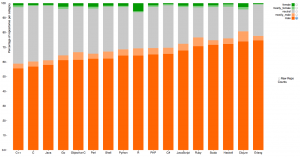Gender, coding, and measurement error
Alyssa Frazee, a PhD student in biostatistics at Johns Hopkins, has an interesting post looking at gender of programmers using the Github code repository. Github users have a profile, which includes a first name, and there programs that attempt to classify first names by gender.
This graph (click to embiggen, as usual) shows the guessed gender distribution for software with at least five ‘stars’ (likes, sort of) across programming languages. Orange is male, green is female, grey is “don’t know”
The main message is obvious. Women either aren’t putting code on Github or are using non-gender-revealing or male-associated names.
The other point is that the language with the most female coders seems to be R, the statistical programming language originally developed in Auckland, which has 5.5%. Sadly, 3.9% of that is code by the very prolific Hadley Wickham (also originally developed in Auckland), who isn’t female. Measurement error, as I’ve written before, has a much bigger impact on rare categories than common ones.
Thomas Lumley (@tslumley) is Professor of Biostatistics at the University of Auckland. His research interests include semiparametric models, survey sampling, statistical computing, foundations of statistics, and whatever methodological problems his medical collaborators come up with. He also blogs at Biased and Inefficient See all posts by Thomas Lumley »

Thought I’d seen reports of women coders’ being harassed on Git; would explain using a different name.
11 years ago
Surely there are also a bunch of plausible explanations around the fact this is only 5 star software.
11 years ago
I don’t see why. It’s not a very high bar, and you need some way to filter out projects that never really got started. You could run it with, say, a two star threshold and see if it makes a big difference.
11 years ago